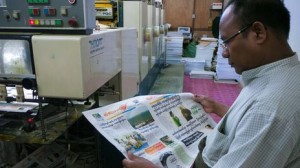

| Visitors Now: | |
| Total Visits: | |
| Total Stories: |

| Story Views | |
| Now: | |
| Last Hour: | |
| Last 24 Hours: | |
| Total: | |
Burma: Private Newspapers Back After 50 Years
< 
Publisher U Win Htay looks at the front page of his new daily, Standard Time
Burma: Private Newspapers Back After 50 Years
Stephen: Depending on who owns these new newspapers and what sort of editorial control they have, this story from Burma could be seen either way. But one hopes, after almost 50 years of media censorship, that this will allow the people of Burma to get receive their news via a variety of sources. Thanks to Bregje.
Burma Sees Return of Private Newspapers
Jonathan Head, Rangoon, BBC World News – April 1, 2013
http://www.bbc.co.uk/news/world-asia-21991899
Private daily newspapers are being sold in Burma for the first time in almost 50 years, as a state monopoly ends.
Sixteen papers have so far been granted licences, although only four were ready to publish on Monday.
This is another important milestone on Burma’s journey away from authoritarian rule, the BBC’s Jonathan Head reports from the commercial capital, Rangoon.
Until recently, reporters in Burma faced some of the harshest restrictions in the world.
Private dailies in Burmese, English, Indian and Chinese, which had been commonplace in the former British colony, were forced to close under military rule in 1964.
Subsequently, journalists were frequently subjected to surveillance and phone-tapping, and were often tortured or imprisoned. Newspapers that broke the rules were shut down.
But media controls have been relaxed as part of a programme of reforms launched by the government of President Thein Sein that took office in 2011.
‘Hurdles’
Last August, the government informed journalists they would no longer have to submit their work routinely to state censors before publication.
It announced in December that private dailies would be allowed to publish from 1 April.
Some initial print runs will be a modest few thousand, while the papers assess demand, our correspondent reports.
“I foresee several hurdles along the way,” Khin Maung Lay, the 81-year-old editor of Golden Fresh Land, told the Associated Press.
“However, I am ready to run the paper in the spirit of freedom and professionalism taught by my peers during the good old days.”
The arrival of privately owned papers on the news stands coincides with the first anniversary of the election of opposition leader Aung San Suu Kyi to parliament.
She has since become an energetic player in the assembly, although, like the government, she is finding it difficult to respond to the complex challenges now confronting her country, our correspondent says.
She has been criticised for failing to speak out over the recent wave of attacks on Muslim communities, he adds – an issue over which the newly-liberated media is also being censured after some inaccurate and inflammatory reporting.
Aung San Suu Kyi’s party, the National League for Democracy, is to start printing its own daily newspaper later this month.
]]>< ![CDATA[
]]>< 



I was there one year ago, when they let again publis the Ayayarwadi newspaper.
Check it at:
http://www.tipter.com/trips/burma-adventures-part-i-yangon-mandalay-inwa-and-hsipaw